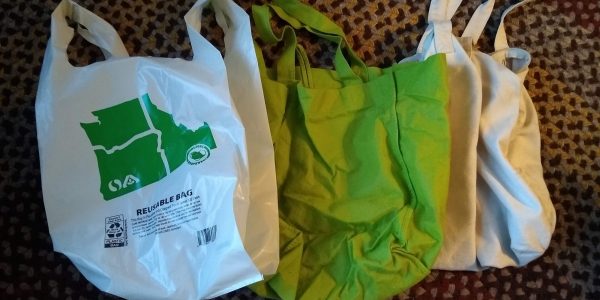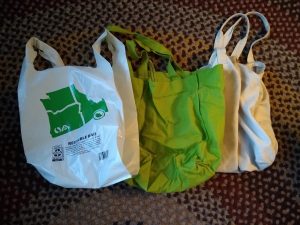Single Use Disposables. Are they actually better than reusables?

What’s better, paper or plastic? Single-use foodware made of petroleum-based or compostable plastics? A reusable canvas bag or a single-use plastic bag? A plastic-lined paper coffee cup or a durable reusable stainless steel Hydroflask?
Many studies have been done comparing different product materials using what’s called a life cycle analysis or LCA. This is a bigger picture process that tries to look at all aspects of a product’s environmental impacts from material extraction to manufacturing to packaging to transport to use and finally end of life. This type of study may give us a better idea of a product’s large scale especially pertaining to climate change, although there are absolutely variables that are overlooked such as human health and wellness or some longer-term environmental impacts.
What SOME studies say
First, I would like to note this study in particular that states some studies are based on old data from inefficient appliances, for example, rather than modern energy star appliances.
Responsible organization: Ohio State University
Summary of findings: “Unlike the headline “Single-use cups win every time!” claimed by the Benelux Disposables Foundation after publication of the TNO report, this study makes no claim of the ultimate superiority of any cup system (Stitching Disposables Benelux 2013).” The point of this study is to show discrepancies between different studies with updated modern appliance data, for example.
Date of Report: May 2013
“Disposable cup scenarios do not account for film sleeves, lids, printing, and less conservative shipping weights and distances and therefore reflect a best case scenario. Impact for reusable cups is expected to decrease further as the electricity mix becomes less CO2-intensive with replacement of coal-fired generators by natural gas, wind, and solar and as less efficient dishwashers are replaced with new units compliant to current laws.”
With that said, here are a handful of examples and a quick summary of their findings. Note: if you read this section, please read through to the end.
1.) Single-use foodware, compostable plastic vs petroleum plastic, link here.
Study title: Material Attribute– COMPOSTABLE How well does it predict the life cycle environmental impacts
of packaging and food service ware?
Responsible organization: Oregon Department of Environmental Quality
Summary of findings: Compostable plastics have a much larger environmental impact than their petroleum plastic alternative.
Date of Report: November 2018
2.) Coffee cups: single-use versus re-usable, link here.
Study title: Single-use versus re-usable (coffee) drinks systems: an environmental comparison
Responsible organization: the Netherlands Organisation for Applied Scientific Research / Benelux Disposables Foundation (SDB).
Summary of findings: The data points toward the disposable cup as being less burdensome on the environment with the caveat that it depends on the cup’s user. The environmental impacts of reusable cups weigh heavily on washing habits.
Date of report: October 2007
3.) Various types of grocery bags including plastic, paper, and cotton, link here.
Study title: Lifecycle Assessment of Grocery Carrier Bags
Responsible organization: The Danish Environmental Protection Agency
Summary of findings: “In general with regards to production and disposal, LDPE carrier bags…are the carriers providing the overall lowest environmental impacts for most environmental indicators…In particular, [those]with rigid handle[s].” Also noted: you would need to use an organic cotton bag 20,000 times to be equivalent.
Date of Report: February 2018
Pretty grim, right? But one thing results like this may drive is innovation in the strife for a circular economy, which really is the ultimate answer to zero waste. So that’s good.
Food for thought:
There are a million variables you can address when designing an LCA. When you’re looking through an LCA report to decide what you are going to do, take that into consideration. Another thing to notice: who funded the study? Whose interests are in mind? Not to mention that there are many ways to analyze data. Can’t you make statistics say anything? (Ok, that’s a stretch, but you get my drift.)
I think it’s important to point out that none of these studies takes the future of ecosystems and individual species into consideration, mostly because it is not quantifiable. How, exactly, does one quantify the complete loss of a species due to the existence of plastic in its environment? It’s true that the environmental impact of a product’s lifecycle may correlate to the health and wellness of a species, but correlation is not the same as causation. And where in any LCA does it talk about the health impacts of people who live in the shadow of the petroleum plant where the plastics are made, such as what’s now known as “Cancer Alley” in Louisiana? (Here is a really great TEDx talk from Van Jones talking about the impacts of plastic on poor people that’s worth a watch if you have 12 minutes.)
While I can’t 100% agree or disagree with the outcome of any LCA, I think they are an important piece of the puzzle to figure out what is best and what isn’t. But I want to challenge you to think about the greater implications of any choice you might be making.
In the end…
…the real answer to the question “paper or plastic?” is this, in my opinion:
Use what you already have. Then questions yourself: do you need the thing you seek? If so, do your best to buy it used.
Right now, more than ever it’s apparent how heavily we rely on single-use. During the pandemic, we’ve seen single-use disposable masks littering the streets, piles of take-out containers in our trashcans, and we aren’t allowed to bring our own cups to the coffee shop. What are we supposed to do? Here are my takeaways:
- Use what you already have, any time you are able.
- If you need something you don’t have, buy it used.
- Supporting local business is important, and I encourage it! Buying locally means you can sometimes avoid extraneous shipping packaging, for example, and it’s good for our local economy. And when you’re getting local take out, at least say no to the napkins and condiments.
- Do your own research and find out what you think is right.
